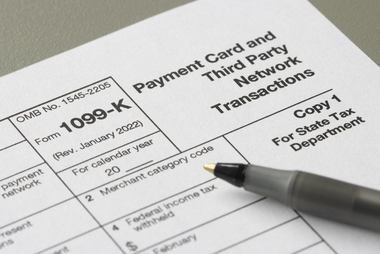If you thought that selling those Taylor Swift tickets this past year on StubHub was going to get you a form 1099-K, then think again.
The Internal Revenue Service has recently announced that they are postponing the lower threshold of $600 for Form 1099-K reporting, and will not be instituting any changes until 2024. This is a surprise paperwork reprieve for millions of Americans. It delays a new requirement affecting many people, from those that sell merchandise on eBay to anyone who rents out their home on Airbnb. The old threshold of more than $20,000 in revenue or 200 transactions remains in effect for 2023. The IRS will begin transitioning toward the new system in tax year 2024, and will use a $5,000 threshold that year.
Form 1099-K is utilized by payment settlement entities to report payments processed for merchants or sellers through payment card transactions or third-party network transactions such as PayPal and Venmo. It ensures transparency in tracking and reporting income received by businesses and individuals.
Reporting requirements do not apply to personal transactions such as birthday or holiday gifts, sharing the cost of a car ride or meal, or paying a family member or another for a household bill. These payments are not taxable and should not be reported on Form 1099-K.
However, the casual sale of goods and services, including selling used personal items like clothing, furniture and other household items, could generate a Form 1099-K, even if the seller has no tax liability from those sales.
The American Rescue Plan Act in March 2021 announced a lower threshold for third parties reporting transactions on 1099-K to $600. This change was initially planned to go into effect for the 2022 tax year. However, at the end of last year, the IRS announced it was postponing the lower threshold due to the IRS not having enough capacity to process all the expected 1099-K forms. In addition, there was substantial public backlash regarding the lower threshold.
The IRS has now extended the postponement of the lower threshold for the 2023 tax year. According to the IRS, “the delay will reduce potential confusion caused by the distribution of 44 million Form 1099-K’s that were estimated to be sent to many taxpayers who wouldn’t expect one and may not have a tax obligation, adding, a complexity in distinguishing between taxable and non-taxable transactions.”
This delay offers a reprieve to smaller businesses and individuals engaging in digital transactions, exempting them from the additional reporting burden for transactions falling below this threshold. The delay doesn’t change what taxes anyone owes, just what online platforms must report to the IRS. If you collect payments from your customers via Venmo, you still must track and report your income on your individual tax returns.
Please reach out to your LMC professional with any questions regarding this new update.



